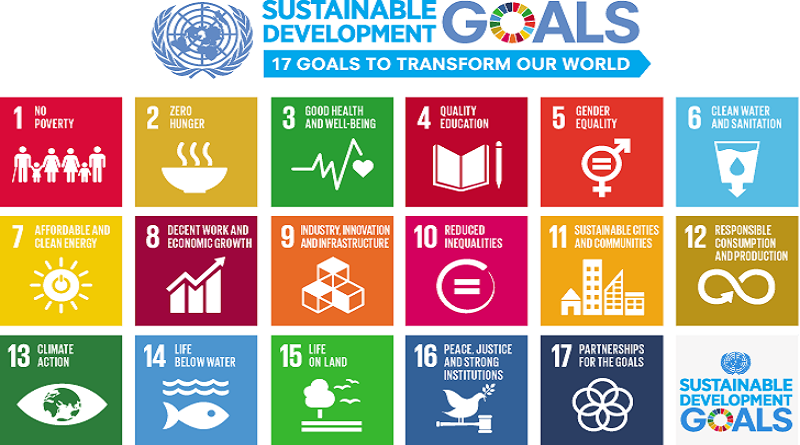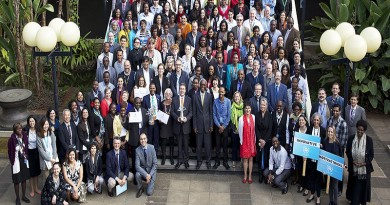New report exposes dangers of fossil fuel to sustainable development goals
As the UN commemorates 50 years since the first international summit on the environment, a new report exposes the critical dangers that fossil fuels pose to all 17 sustainable development goals.
The report, coined Fuelling Failure: How coal, oil and gas sabotage all seventeen Sustainable Development Goals, finds that oil, gas and coal production and emissions are a primary threat to our water, health, biodiversity and ability to provide economic and energy security. It calls for an international framework with binding commitments that constrain fossil fuel production globally, one that complements existing pledges to cut emissions, reverse biodiversity loss and curtails pollution which the world fails to meet due to their rampant fossil fuel production.
The report, which is draws on more than 400 academic articles, civil society reports and case studies, acknowledges that “the exploration, extraction, refining, transportation and combustion of oil, gas and coal is making it impossible for the global community to meet the SDGs, threatening lives and livelihoods, and the ability of the planet to sustain human wellbeing”. Today’s most pressing crises – from poverty, world hunger, health and conflict – are all made increasingly difficult in a warming world.
Co-author Freddie Daley, Research Associate at the University of Sussex, said: “2030 is a line in the sand for the health of our planet and its people. By 2030, humanity needs to have halved global emissions, while at the same time achieving all 17 SDGs. This is an impossible endeavour without concerted global efforts to constrain and phase out fossil fuel production in a fast, fair and equitable manner, with the wealthy nations that continue to benefit from fossil fuelled economic growth leading the way. This research lays out the incompatibility of sustainable development and fossil fuels – and what is at stake if we fail to address unchecked fossil fuel expansion.”
Current international climate agreements primarily focus on emissions reductions and make no mention of fossil fuels. The international framework required to align efforts to achieve the SDGs with ending the era of fossil fuels could take the form of a Fossil Fuel Non-Proliferation Treaty, which has garnered support in cities around the world and amongst leading parliamentarians, scientists, academics and faith leaders.
Tzeporah Berman, Chair for the Fossil Fuel Non-Proliferation Treaty Initiative and Stand.earth International Programs Director, said: “Fossil fuel addiction poisons every earnest attempt we make to tackle the sustainable development and climate agendas. Despite a robust pile of evidence that fossil fuels are core to our problems, governments are not moving and international cooperation is lacking. We have the solutions at hand but the obstacle is a lack of political courage. Bold new ideas like the Fossil Fuel Non-Proliferation Treaty are necessary to revive our living systems and take them off life support.”
The paper was produced by researchers at the University of Sussex on behalf of the Fossil Fuel Non-Proliferation Treaty Initiative and key civil society partners with expertise across the SDGs: 350.org, ActionAid, REN21, Stand.earth, Health Care Without Harm, CAN South Asia, UNRISD, Food and Water, Rapid Transition Alliance, Leave It In the Ground Initiative, GAIA, CAN International, Center for Biological Diversity, Stamp Out Poverty, MOCICC, Power Shift Africa, WECAN and Asian Peoples’ Movement on Debt and Development.
The full report is available online as well as the executive summary. The paper will be presented at a virtual public event ahead of the Stockholm+50 conference on Wednesday, 1st June, 9.30am-10.30am CEST.
Kjell Kühne, founder of the Leave It In The Ground Initiative (LINGO), said: “In the early 2020s, we are moving into the fossil endgame. Because we have delayed it for so long, we will need to play it much faster now. Everyone should get ready for a rapid transition ahead – either as an active driver and participant, or as a fossil age relic to be washed away by the new times.”
Teresa Anderson, global lead on climate justice for ActionAid International, said: “Drought in the Horn of Africa means that 20 million people are currently at risk of famine. The world’s food systems are struggling to cope with the rising temperatures and haywire weather patterns caused by fossil-fuelled climate change. Farmers are no longer able to predict when rains will come, and are struggling to grow enough food for their families and communities. We’re now at the point where we have to choose between fossil fuels and food security, because an overheating planet will not be able to feed humanity.”
Josh Karliner, International Director of Program and Strategy at Health Care Without Harm, said: “Civilization has two paths before it. We can either collectively continue our addiction to fossil fuels thereby undermining public health and the natural systems that support life on the planet, throwing the SDGs out the window along the way. Or we can kick the fossil fuel habit and organize a just transition to clean, renewable energy systems that will help foster healthy people on a healthy planet, thereby giving us a fighting chance to meet the Sustainable Development Goals. The health of future generations depends on our action today.”
Wenonah Hauter, executive director of the environmental advocacy organization Food & Water Watch, said: “This comprehensive report from the Fossil Fuel Treaty Initiative makes abundantly clear what we’ve been warning for years: There is no viable solution to the climate crisis that can include continued reliance on fossil fuels. In spite of real progress made on many sustainable development goals around the world, the ultimate success or failure in our mission to maintain a livable climate for future generations depends on transitioning fully to clean, renewable energy now.”
Mariel Vilella, Director of GAIA’s Global Climate Program, said: “The fossil fuel industry is using a false “net zero” narrative to justify investing billions to increase plastic production, with low income communities and communities of colour suffering the worst impacts. This needs to stop: both the SDGs and the Paris Climate Agreement are being actively undermined by this suicide mission to produce more plastic waste.”
Mohamed Adow, director of Power Shift Africa, said: “The fossil fuel industry is built on servicing extractive systems and has left communities – especially those in Africa – vulnerable to socio-economic and ecological traps, shocks and under development. Fossil fuels are undermining sustainable development in many ways, including fuelling catastrophic extreme weather impacts on our people’s lives and livelihoods. To achieve sustainable development, we need to see a rapid and urgent shift away from fossil fuel investments and increased financing of people-centred, community-owned, decentralized and distributed, accessible, resilient, and affordable renewable energy systems, particularly for the vulnerable sections of the society in Africa.”
Osprey Orielle Lake, Founder/Executive Director of the Women’s Earth and Climate Action Network (WECAN), Steering Committee member for the Fossil Fuel Non-Proliferation Treaty, said: ”Globally women are strategizing and working to accelerate our collective efforts to halt the worst impacts of the climate crisis, stop extractivism at the source, and protect our lands, forests, water, and global climate for current and future generations. Studies worldwide demonstrate that women are essential to resolving multiple interlocking crises. Women’s leadership and solutions are vital to ending the era of fossil fuels and pushing forward innovative solutions, like the Fossil Fuel Non-Proliferation Treaty which ensures an end to sacrifice people and sacrifice zones, and the protection of our global communities and ecosystems.”
Paul Ladd, Director of UNRISD, said: “This important and timely report sheds light on a simple truth: The continued reliance on fossil fuels is not compatible with sustainable development. Unpacking a wealth of information and data, it showcases the many ways in which fossil fuel extraction and use undermine sustained progress across the range of SDGs. We must do everything we can in order to accelerate a low-carbon transition that is built on principles of equity, justice and inclusion.”
Jean Su, director of The Centre for Biological Diversity, said: “Every day that we burn fossil fuels is one more day that we’re undermining these goals for a sustainable, livable planet. The first step to fighting the extinction of countless species and the scourge of global poverty is to turn off the spigot of dangerous fossil fuels. That’s the only way we can build a just, peaceful future that protects the dignity of humanity and all life on Earth.”
Lidy Nacpil, Coordinator for Asian Peoples’ Movement On Debt And Development, said: “This report makes clear that fossil fuels are weapons of mass destruction. In the Global South, the extraction and burning of fossil fuels threatens millions of lives through devastating climate impacts while dependence on fossil fuels locks countries into increasing cycles of debt, fuelling poverty and undermining education, jobs and health. Already more than 200 parliamentarians, led by representatives from the Global South, have joined a global call for a Fossil Fuel Free Future to break this cycle of debt and destruction. We need international cooperation on a global just transition from fossil fuels to make this future a reality.”
David Hillman, Director of Stamp Out Poverty, said: “The catastrophic warming of our planet through the relentless burning of fossil fuels is devastating the lives and livelihoods of people now. Between the tropics, particularly, populations are at the sharp end of increasingly violent storms and crop-destroying droughts. Impacts to food and water security are causing poverty to rise with previous progress on the SDGs going into reverse. There is only one way to break this cycle, we need to stop using fossil fuels. There simply is no time to lose.”
Mahir Ilgaz, Associate Director, Global Policy and Campaigns for 350.org: “This report demonstrates once again that there can be no fossil fuel based development, and any energy system based on fossil fuels is bound to failure while also damaging our health, prosperity, and environment. The false dependencies created by the fossil fuel industry are entirely of their own making and avoidable. As the energy transition progresses, dependence on fossil fuels as the main sources of our energy mix will have an additional effect on our economies, as these investments lose their value. Fossil fuels are not only destroying our climate but they are also undermining our right to development through the appropriation of resources that should be going to clean and just development for all.”




